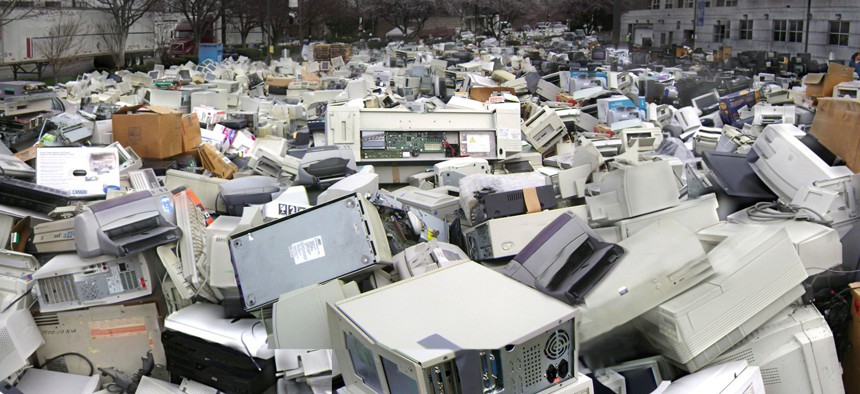DARPA explores electronics recycling to extract critical elements

GettyImages/ Bill Hinton
If successful, the technology could reinvent recycling and manufacturing to minimize the impact of supply chain disruptions to critical elements essential for the Defense Department's high-performance hardware.
To improve recycling of electronic waste and minimize supply chain disruptions for critical elements essential to computing hardware, the Defense Advanced Research Projects Agency is looking for ways to extract particular elements from discarded electronics.
Gold, silver, copper, platinum and palladium are used in the manufacture of hard drives, capacitors and printed circuit boards. Current processes for recovering those precious metals require heat or liquid chemical leaching, which is not only dangerous to workers but delivers only relatively small quantities of one element or another.
Electronics and large appliance also use rare earth elements -- which are essential to many energy, transportation, defense and communications applications – but there is very limited recycling of those elements.
DARPA's Recycling at the Point of Disposal (RPOD) disruption opportunity will evaluate the feasibility of separating and extracting multiple critical elements from electronic hardware, according to a Jan. 25 special notice. DARPA specifically wants to be able to extract several specific elements from a "feedstock" containing a mixture of elements along with other materials.
The precious-metals e-waste recovery market is well established. It is expected to grow from $9.4 billion in 2020 to $11.8 billion by 2025 – fueled by discarded consumer electronics, according to an August 2021 Markets and Markets report.
In 2019, researchers at the Department of Energy's Oak Ridge National Laboratory invented and licensed a process to extract rare earth elements from the scrapped magnets of used hard drives, about a third of which are shredded due to security concerns.
Researchers at Yale, meanwhile, are building technology to reclaim and separate specialty and rare earth metals from e-waste using nanotechnology-enabled filters that can selectively separate two metals from a mixed metal waste stream.
But DARPA is interested in finding a way to extract multiple critical elements found in discarded electronics.
"RPOD aims to develop novel extraction chemistries and explore practical limits of yield, extraction efficiency, and purity to recover a selective list of critical elements from commercial and DoD e-waste," the announcement said. If successful, the technology could reinvent recycling and manufacturing to minimize the impact of supply chain disruptions to critical elements essential for high performance Defense Department hardware.
The Information Session will be held via prerecorded webcast on Feb. 8. More information available here.






